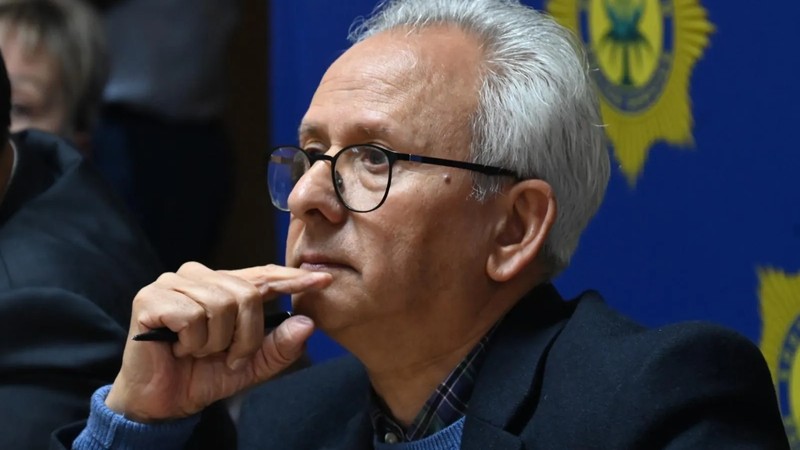Cachalia refuses to apologise for criticising Mkhwanazi's use of combat gear
Acting Police Minister Firoz Cachalia on Wednesday refused to apologise for making remarks about KwaZulu-Natal Nhlanhla Mkhwanazi appearing in combat gear when he made serious allegations at a press conference on July 6.
This was after MK Party MP Vusi Shongwe asked the acting minister to apologise to Mkhwanazi after Cachalia conceded that he did not know if the wearing of the Task Force Unit uniform was legal or not.
Cachalia had earlier said that he was concerned about the image of someone dressed like a soldier, appearing in public making statements.
When Shongwe pressed the acting minister to apologise, Cachalia said that he had never said Mkhwanazi was not entitled to wear the uniform or it was illegal to do so.
“There is no need for me to apologise about something that was not intended badly. There was no insult and so I don’t apologise,” he said.
Cachalia also said he believed the issues raised by Mkhwanazi were important.
“I shared my initial impressions with the public in an open way in what it means to have public discourse and if my comments occasioned public discourse, it is a good thing.”
He added that Mkhwanazi has not demanded an apology and he was unsure he needed the MK Party to act on his behalf.
“If he wants an apology, he knows how to engage with me. That will be entirely different. The question does not arise because there was no insult,” he said.
Testifying earlier at the parliamentary inquiry probing Mkhwanazi’s allegations, Cachalia said Mkhwanazi’s appearance before the public, while armed and in full military regalia worried him and he had made a statement to that effect after his appointment.
“I said at the time, which I maintain is correct, that kind of public statement was not in the ordinary situation in the expected situation (and was not) appropriate because police have command structures.”
During the question session, MK Party MP Sibonelo Nomvalo asked why Cachalia was concerned about the uniform Mkhwanazi wore during the press conference.
In response, Cachalia said in a democracy it was important for there to be a clear separation between political authority and the military.
“My initial impression was what is going on? Is this South Africa? It conjured up images in my mind of kind of a coup d’état.”
Cachalia said President Cyril Ramaphosa and Parliament did the right thing in appointing the inquiries to probe Mkhwanazi’s allegations.
“This is how democracies deal with their problems,” he said, adding that Mkhwanazi deserved recognition as a whistle–blower and deserved to be protected by the law.
During his testimony, Cachalia told the inquiry that he did not have an engagement with suspended Police Minister Senzo Mchunu on why he disbanded the Political Killings Task Team (PKTT).
“I did not reach out to my predecessor, nor did he to me to have a normal handover. That was a deliberate decision by me,” he said.
Asked whether it did not concern him that he had no handover from Mchunu, Cachalia said he did not want the suspended minister to feel that he had prejudged the matter.
He said had he met with Mchunu, there would have been an inevitable conversation about the events concerning the disbandment of the team.
“He would clearly have taken the opportunity to share his impressions with me. That would have made it difficult for me to build trust with General (Fannie) Masemola and certainly General Mkhwanazi.”
Cachalia came out in support of the continued existence of the PKTT, saying there was a need for a strategy to fight organised crime, utilising prosecution-led investigations.
Masemola made a recommendation to him that the task team should continue to exist and that similar capacity needed to be developed – Cachalia said he was in the process of doing so in Gauteng.
Asked earlier how he would have approached the issue of the disbandment of the PKTT, Cachalia said there ought to have been consultation with colleagues in Cabinet before arriving at the decision.
He also said there also had to be mutual respect and consultation between the head of department and the political head of an institution.
“If that relationship breaks down, functioning of that institution is compromised. It is no different in the public sector,” he said.
“It is a question of decision-making, roles and responsibilities and how particular decisions are made. Maybe the decision was wrong because of the way the decision was arrived at and communicated and that is why we sit here today.”
Responding to questions, Cachalia said he was in favour of an agenda to ensure police officers were professional, highly trained and to have tools and capabilities to exercise their responsibilities.
He was also in favour of a relook into the appointment of the executive director of IPID.
“Currently that position is appointed by the minister. Perhaps, it should be relooked at.”
He also said there was a need for stability within the Crime Intelligence Unit so that they can start with the implementation of reforms.
”We are not going to win the battle against organised crime if we don’t tackle the problems within Crime intelligence,” Cachalia said.
mayibongwe.maqhina@inl.co.za

